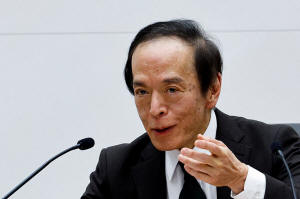|
"If
our price forecasts change, that would also be a reason to
change monetary policy. But we don't have any preset idea on the
specific timing and pace" of rate hikes, Ueda told parliament on
Tuesday.
The remarks come ahead of the BOJ's two-day policy meeting that
ends on Friday, when the board is set to keep interest rates
unchanged and announce fresh quarterly growth and inflation
forecasts.
The BOJ is likely to project inflation will stay around its 2%
target for the next three years, sources have told Reuters,
which would cement expectations the central bank will raise
interest rates again this year from current near-zero levels.
The central bank ended eight years of negative rates and other
remnants of its unorthodox policy last month, making a historic
shift away from decades of massive monetary stimulus that was
aimed at quashing deflation and revitalizing growth.
Ueda said the BOJ must maintain ultra-loose monetary policy for
the time being as trend inflation, or price rises driven by
domestic demand and measured by scrutinizing various indicators,
remains "somewhat below 2%".
While core consumer inflation has stayed above its 2% target for
two years, the BOJ has said it would go slow on further rate
hikes to ensure price rises are driven more by robust domestic
demand and prospects for sustained wage increases.
The weighted median inflation rate, a key measure of Japan's
trend inflation, rose 1.3% in March from a year earlier, data
showed on Tuesday, slowing from a 1.4% gain in February and
marking the smallest year-on-year increase in 11 months.
"We will set our short-term interest rate target at a level
deemed appropriate to sustainably and stably achieve our 2%
inflation target," Ueda said.
"If trend inflation accelerates toward our target as we expect,
we will adjust the degree of monetary stimulus by raising
interest rates," he said.
Ueda said the future policy course was data-dependent, adding
that it was hard to predict how soon the BOJ could gather enough
data to determine the timing of its next rate hike.
Economists polled by Reuters were divided on the timing of the
BOJ's next hike with some betting on action in the third
quarter, while others projecting October-December or beyond.
(Reporting by Leika Kihara; Editing by Christian Schmollinger,
Jacqueline Wong and Shri Navaratnam)
[© 2024 Thomson Reuters. All rights
reserved.]
This material may not be published,
broadcast, rewritten or redistributed.
Thompson Reuters is solely responsible for this content.

|
|




